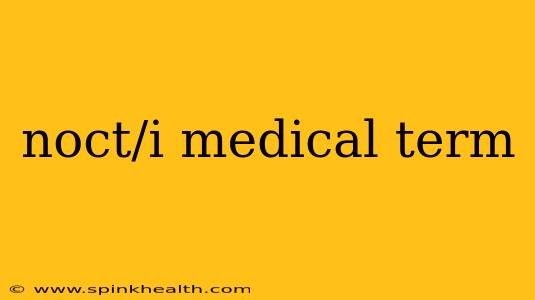The medical term "noct/i" (or sometimes "nyct/i") is a combining form derived from the Latin word "nox," meaning "night." It's used in numerous medical terms to describe conditions, symptoms, or processes that occur primarily or are specifically related to the night. Let's delve into the fascinating world of "noct/i" and uncover its significance in the medical field.
Imagine this: you're a seasoned medical professional, paging through patient files. One case catches your eye—a patient exhibiting symptoms exclusively during nighttime hours. The key to understanding the patient's condition often lies in recognizing terms prefixed with "noct/i."
What Does Noct/i Mean in Medical Terminology?
As mentioned, "noct/i" simply means "night." This prefix sheds light on the timing of a specific symptom or condition. It immediately narrows down the diagnostic possibilities, leading to faster and more accurate diagnoses and treatment plans. Understanding its use significantly enhances your medical understanding and allows you to better interpret complex medical reports and patient records.
Common Medical Terms Using Noct/i
Let's explore some frequently encountered medical terms incorporating the "noct/i" prefix:
-
Nocturia: This is a classic example. Nocturia refers to excessive urination at night, a common complaint among many individuals, particularly the elderly. The prefix instantly clarifies that this urinary frequency is a nighttime phenomenon.
-
Nocturnal: This adjective describes anything happening during the night. You might see it in phrases like "nocturnal enuresis" (bedwetting) or "nocturnal emissions" (nighttime ejaculations). The term's simplicity allows for easy comprehension of night-related events.
-
Nocturnal Dyspnea: This term points to shortness of breath experienced specifically at night, often associated with heart conditions. Knowing this, a physician can immediately consider cardiac issues in the differential diagnosis.
-
Nocturnal Cough: A cough primarily occurring at night could be a sign of various conditions, from postnasal drip to asthma. The "nocturnal" prefix immediately alerts healthcare professionals to focus on nighttime triggers and potential underlying issues.
Frequently Asked Questions (FAQs) about Noct/i
Here, we address some common queries surrounding the "noct/i" prefix:
What causes nocturia?
Nocturia has multiple potential causes. These range from simple increases in fluid intake before bed to more serious underlying health conditions like:
- Benign prostatic hyperplasia (BPH): An enlarged prostate gland is a common cause in men.
- Diabetes: High blood sugar levels can lead to increased urination.
- Heart failure: Fluid retention can cause increased urination at night.
- Kidney disease: Impaired kidney function may lead to excessive urination.
- Urinary tract infections (UTIs): Infections can irritate the bladder, causing frequent urination.
How is nocturnal dyspnea treated?
Treatment for nocturnal dyspnea depends heavily on the underlying cause. It often involves managing the heart condition (if present) and can include medications to reduce fluid retention, oxygen therapy, and lifestyle modifications.
Is nocturnal cough always serious?
Not necessarily. A nocturnal cough can be a symptom of a simple cold or allergies. However, persistent or severe nocturnal coughs warrant a consultation with a healthcare professional to rule out more significant respiratory conditions like asthma or chronic obstructive pulmonary disease (COPD).
What are some other medical terms that use "noct/i"?
While the terms mentioned above are common, other less frequently used but equally important terms exist. These might include terms related to specific sleep disorders or nighttime behaviors. Always consult a medical dictionary or professional for precise definitions.
In conclusion, understanding the medical prefix "noct/i" significantly aids in interpreting patient symptoms and medical reports. It serves as a crucial element in quickly pinpointing the timing and potential causes of various conditions, contributing to more accurate diagnoses and efficient treatment strategies. Remember that this information should not replace advice from a medical professional. Always consult a doctor or other qualified healthcare provider with any questions you may have regarding your health or a medical condition.

